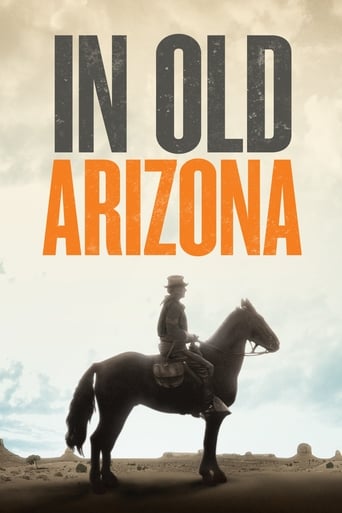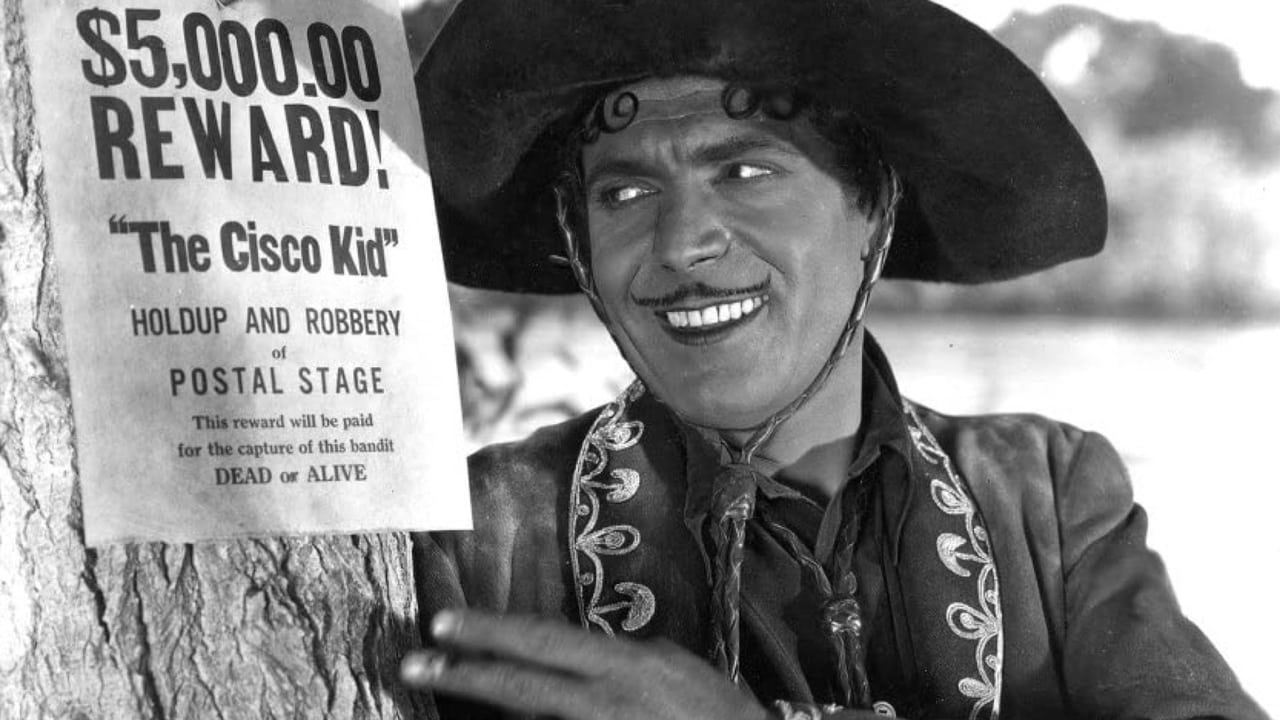evanston_dad
"In Old Arizona" stars Warner Baxter in an Oscar-winning performance as the Cisco Kid, an outlaw who's double crossed by his love and rides off into the night after meting out his revenge. It's a rather bleak ending actually, and the film leading up to it is pretty racy for the time, dealing with things like infidelity quite frankly. It's a bit slow-paced and leisurely, but it's not half bad. It was nominated for a Best Picture Oscar in the second year of the Academy Awards, and it's much better than the other two competitors I've managed to see ("Alibi" and the film that won the Best Picture Oscar, "The Broadway Melody").I don't know that Baxter's performance is a stand out in the history of movie performances, but he does exhibit quite a bit of charm, and he's natural with the new medium of sound in a way that many other actors at the time weren't. Edmund Lowe, who plays the soldier out to get the Cisco Kid and who looks like a young John Wayne, is also quite good and provides the movie with much of its suggestiveness.The film was also nominated for Best Director (Irving Cummings), Best Writing (Tom Barry) and Best Cinematography (Arthur Edeson).Grade: B
romanorum1
In Old Arizona, produced and directed in 1928, was the first talkie Western. As the media was new, the film sounds a bit creaky. But there is no need to delve into the various indoor or outdoor sounds, like the frying of ham and eggs or the gramophone music or the mooing of cows or the funny jackass braying scene. One does notice – again because of the new media – overacting. Such exaggeration was generally needed – or was thought to be needed – in silent films to convey to the audience what the actor felt or thought. Directors even demanded it. So we should not be too harsh on the brave filmmakers that made the significant movie transition to talkies in the late 1920s.The title of the movie is rather curious as the events occur only 30 years before it was made. There are references to the upcoming Spanish-American War (1898) and, early in the film, several soldiers sing, "Daisy Bell (Bicycle Built for Two)," a song popular in the 1890s. The US frontier officially ended in 1890, so one would think that the movie events in Arizona would have transpired decades earlier. But an 1898 Western is fine enough, as some areas were still wild. There is more talk than the action associated with Westerns, with the story really focusing on three people. But the finale is certainly unexpected unless one read the 1907 short story by O. Henry; that author's stories were known for their surprise endings.Warner Baxter as the Cisco Kid won the Academy Award for Best Actor. But note that his role is not the "Robin Hood of the Old West" (Duncan Renaldo) of the 1950s TV series. Unlike Renaldo, the Kid here is harsh and unforgiving, although he is charming and is not a heartless murderer. He is somewhat the gentleman robber: when he holds up a stagecoach, he refuses to takes money from the passengers. Dorothy Burgess as the dithering and provocative Tonia Maria plays an alluring love interest for any man. Edmund Lowe, who looks like and has the mannerisms of an Irish Sergeant (Mickey Dunn), is supposed to have a New York accent ("Who is that goil?"). Then there are the typical stereotypes that lingered in Hollywood films for many decades (and still do). The Italian barber (Henry Armetta) is exuberant and a bit of a buffoon. The barber likes his women just plain "a-fat," not pleasingly plump.Despite the film's showing its old age with its creakiness and slow pace for a Western, it is still historically important. So it is recommended for film and history buffs, and for the curious.
Michael_Elliott
In Old Arizona (1928) ** 1/2 (out of 4) A rather landmark film was the first all sound Western and it was also the first film to do sound outdoors. Another thing worth noting is that actor Warner Baxter would pick up the Best Actor Oscar for his performance as The Cisco Kid. Thirdly, director Raoul Walsh was originally set to star and direct but his automobile wreck, which cost him his eye, forced him to leave production for several months. As for the film itself, The Cisco Kid (Baxter) is romancing his lovely lady (Dorothy Burgess) while a government man (Edmund Lowe) is out tracking him down. Soon a love triangle forms and one person will have to go. Several review I read had me somewhat nervous about this film but it turned out to be a lot better than I expected. There are many problems and, like with many early sound pictures, the filmmakers spend more time showing everyone talking that they forget to do much else. The entire film is pretty much all talk with very few action scenes. This gets a little tiresome after a while but the ending is certain effective but of course I won't spoil it for you. The early sound techniques are also quite weak as is the cinematography, which seems more like something you'd see in 1900 rather than 1928 but then again they were shooting outdoors with sound for the first time so the camera didn't move much. What really works are the performances by Baxter and Lowe. Baxter of course won an Oscar but this isn't anywhere near his greatest role or performance but he's quite fun. I viewed this film via TCM during their Mexican Heritage month where they had a guest speaker talking about a good point, which is that future Mexican roles, in regards to their speech, all borrowed from this film, which pretty much started the stereotype. I was also impressed with Lowe who was quite charming. In the end this is a historically important film that all film buffs should at least check out once but repeat viewings would be pushing it.
John T. Ryan
ANYONE WHO GREW up during the period of 1930-60 in the USA, Canada, Timbuktu or anywhere that the Hollywood output is exhibited, would be familiar with "O. Henry's famous Robin Hood of the Old West
". The Cisco Kid and his sidekick, Pancho (sometimes referred to by the nickname of "Gordito" or "Little Fatty" in English) were a mainstay of the "B" Western Movie scene and later, as a Juvie TV Series. The role of the Kid had been passed from Baxter (the first talkie Cisco) to Caesar Romero to Gilbert Roland and then Duncan Renaldo; who essayed the role in both the last Monogram theatricals and the Ziv Television). Pancho/Gordito was perennially the job of Chris Pin-Martin; until Leo Carillo moved into the part with 'partner' Mr. Renaldo.RELATIVELY FEW PEOPLE of this very same period were acquainted with the portrayal of this character by Warner Baxter; whom we are told won an Oscar for his performance as 'Best Performance by an Actor for 1929', the first really full year of sound pictures. This may seem to be a rather strange occurrence for what was a 'Major Motion Picture' and there is no definitive answer for it. However we believe we can offer a plausible and most probable reason for the film's lack of familiarity.AS WE SEE it, the initiation of the CISCO KID Movie Series refined and softened the character; rendering Cisco more palatable for Family Viewing. Whereas we still saw wanted posters with a reward for his capture throughout the life of the series as it changed Studios from 20th Century-Fox to Monogram and passed the right to the Cisco Sombrero from Baxter to Romero, Roland and Renaldo; there was always plausible reasons to believe that poor Cisco was just a misunderstood ex-bandito, with the proverbial 'Heart of Gold.' FURTHERMORE it appears that there may be another reason. Once again this is only conjecture, but there appears to have been a conscious effort by Fox to hold back the release of many of their earliest Talkies from release to the 1950's Television market. This lack of interest by the Copyright Owner, the 20th Century-Fox Film Corporation, may also have contributed to a an apparent neglect of their earliest sound pictures.** WITH REGARD to the film, itself, IN OLD ARIZONA has all of those indicators that label it as being a very early talkie; even up to the point of possibly labeling it as being a primitive sound feature. All of the elements are present that reflect an overall lack of familiarity with the problems of coordinating the sound with the imagery of the movement of the players.THIS IS NOT a slam on the Director. Raoul Walsh was a veteran of the great Silent Films of D.W. Griffith; having portrayed John Wilkes Booth in BIRTH OF A NATION. Mr. Walsh brought the experience of what was probably close to 29 years when he took possession of 'the Chair' to do the picture in 1928.* His innate talents were definitely on display; although he was undoubtedly continuing to learn and grow. It is our amateur opinion that much of the excessive and often awkward insertion of musical numbers in this movie and in so many others of that period was the result of an overwhelming desire by the various Studios to render their products as being close as possible to "All Talking. All Singing and All Sound!" FOR WHAT WE expected from a 'Horse Opera', there certainly was an awful lot of dialogue. Of course, there was a story to tell and durn it if they weren't going to talk us through all of that exposition. In an incredibly short span of on screen time, we are introduced to Cisco, Army Sgt. Mickey Dunn (Edmund Lowe) and the lovely Tonia Maria(Dorothy Burgess); who places herself directly in the collision course path that the two were set on from the very start.THERE IS A decidedly "Adult" viewing rating here. We see the large numbers of Working Girls present in the Gin Mill that this town has all of the Thorns that go along with the Roses in any Bouquet. This town's appearance and reputation would certainly not put it in good standing as fit subjects for Walt Disney or Norman Rockwell to use in their projects.ALONG THE SAME line, Director Walsh leaves us with no doubt that the Senorita Tonia Maria was less than a girl next door type. In her very first appearance on the screen, we see her dispatching a 'John' from her house; cautioning him to high tail it, for Cisco is arriving presently. Her love of money is made explicit as she obviously seems interested in more and more of it. Cisco doesn't realize it; but he is being played as a chump. Her favors are bestowed to many others. Unknown to the Kid is the undeniable truth that to her, he is just another 'Trick'.THE HOLD-UP of the Stagecoach by Cisco at the beginning of the story and the comic relief situation of having our Anti-Hero meet up with the unsuspecting town Sheriff and equally clueless Sgt. Dunn in the town Barber Shop; while he was getting a shave and taking a bath, all were important preludes to a most surprising and gruesome a climax.UNTIL WE MEET again, Schultz and I want to say, "GOOD-BYE AMIGOS, SEE YOU SOON!" (Roll the Credits, Schultz!) See You Next Time!NOTE: * We read that Raoul Walsh was set to portray Cisco in this film; but just prior to the scheduled shooting time, he was badly injured in an auto accident, losing an eye.NOTE: ** A good example of an early sound movie held back by Fox is SOUP TO NUTS (Fox, 1930) which introduced the movie audiences to Ted Healy & The 3 Stooges. POODLE SCHNITZ!!


 AD
AD


